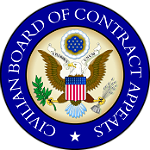
Civilian Board of Contract Appeals
About The Board
The Civilian Board of Contract Appeals (CBCA) was established on January 6, 2007, pursuant to section 847 of the National Defense Authorization Act for Fiscal Year 2006, to hear and decide contract disputes between government contractors and civilian executive agencies under the provisions of the Contract Disputes Act, 41 U.S.C. §§ 7101-7109 (CDA). The CBCA’s authority under this statute extends to all agencies of the federal government except the Department of Defense and its constituent agencies, the National Aeronautics and Space Administration, the United States Postal Service, the Postal Regulatory Commission, and the Tennessee Valley Authority.
The CBCA consolidated into one organization the functions of eight boards of contract appeals – the Departments of Agriculture, Energy, Housing and Urban Development, Interior, Labor, Transportation, and Veterans Affairs, and the General Services Administration. The decisions of the predecessor boards continue as binding precedent at the CBCA. Fourteen administrative judges appointed by the Administrator of General Services under 41 U.S.C. § 7105(b) (2) preside over appeals filed at the CBCA.
In addition to CDA appeals, the CBCA hears and decides various other types of cases. These include:
- Cases arising under the Indian Self-Determination and Education Assistance Act (ISDA), 25 U.S.C. §§ 5325(f), 5331(d);
- Disputes between insurance companies and the Department of Agriculture’s Risk Management Agency involving actions of the Federal Crop Insurance Corporation (FCIC) under 7 U.S.C. §§ 1501 et seq.;
- Claims by federal employees under 31 U.S.C. § 3702 for reimbursement of expenses incurred while on official temporary duty travel (TRAV) or in connection with relocation (RELO) to a new duty station;
- Claims by carriers or freight forwarders under 31 U.S.C. § 3726(i)(1) for payment for transportation services (RATE);
- Applications by prevailing private parties for recovery of litigation and other
costs under the Equal Access to Justice Act (EAJA), 5 U.S.C. § 504;
- Debt collection claims (DBT) in which the General Services Administration seeks confirmation of a debt to proceed with wage garnishment or an administrative offset to recoup money owed by a debtor pursuant to 41 CFR 105-55 to -57;
- Requests for arbitration under section 601 of the American Recovery and
Reinvestment Act of 2009, Public Law 111-5, and section 565 of the
Consolidated and Further Continuing Appropriations Act, 2013, Pub.
L. No. 113-6, to resolve disputes between applicants and the Federal
Emergency Management Agency (FEMA) as to funding for public
assistance grant applications arising from damages caused by
Hurricanes Katrina and Rita;
- Requests for arbitration under Section 423 of the Robert T. Stafford Disaster
Relief and Emergency Assistance Act (Stafford Act), 42 U.S.C. §
5189a(d), as amended by Section 1219 of the Federal Aviation
Administration Reauthorization Act of 2018, Pub. L. 115-254, to
resolve disputes between FEMA and applicants for public assistance
disaster grants arising from disasters that occurred after January 1,
2016;
- Disputes between federal long-term care (FLTC) insurance carriers and the Office of Personnel Management under 5 U.S.C. Chapter 90 and 5 CFR Part 875; and
- Civil fraud claims in which executive agencies seek to recoup up to $1 million under the Administrative False Claims Act pursuant to 41 U.S.C. § 7105(e) and 31 U.S.C. §§ 3801 et seq.
The CBCA also offers options for litigating cases intended to shorten and
simplify the proceedings. These options include alternative dispute resolution
(ADR), small claims procedures, accelerated procedures and alternative
procedures.